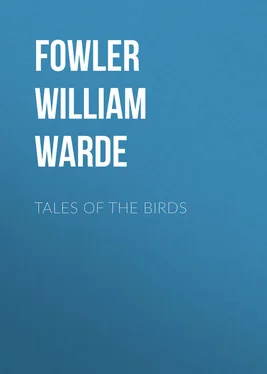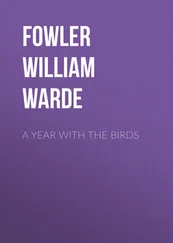William Fowler - Tales of the birds
Здесь есть возможность читать онлайн «William Fowler - Tales of the birds» — ознакомительный отрывок электронной книги совершенно бесплатно, а после прочтения отрывка купить полную версию. В некоторых случаях можно слушать аудио, скачать через торрент в формате fb2 и присутствует краткое содержание. Жанр: foreign_antique, foreign_prose, на английском языке. Описание произведения, (предисловие) а так же отзывы посетителей доступны на портале библиотеки ЛибКат.
- Название:Tales of the birds
- Автор:
- Жанр:
- Год:неизвестен
- ISBN:нет данных
- Рейтинг книги:3 / 5. Голосов: 1
-
Избранное:Добавить в избранное
- Отзывы:
-
Ваша оценка:
- 60
- 1
- 2
- 3
- 4
- 5
Tales of the birds: краткое содержание, описание и аннотация
Предлагаем к чтению аннотацию, описание, краткое содержание или предисловие (зависит от того, что написал сам автор книги «Tales of the birds»). Если вы не нашли необходимую информацию о книге — напишите в комментариях, мы постараемся отыскать её.
Tales of the birds — читать онлайн ознакомительный отрывок
Ниже представлен текст книги, разбитый по страницам. Система сохранения места последней прочитанной страницы, позволяет с удобством читать онлайн бесплатно книгу «Tales of the birds», без необходимости каждый раз заново искать на чём Вы остановились. Поставьте закладку, и сможете в любой момент перейти на страницу, на которой закончили чтение.
Интервал:
Закладка:
He had not been there long, and was beginning to feel calmed and quieted, when there broke out on him from the ivied wall the very same shrill wren’s song that had so wounded his feelings in the morning. It sent a momentary pang through him. There started up before his eyes the broken ink-bottle, the smeared page, the bitter vexation and worry, and the song not even yet begun. But the battle of body and brain was no longer being waged, and as the tiny brown bird sang again and again, and always the same strain, he began to wonder how such cheerful music could ever have so maddened him. It brought to his mind a brilliant bit of Scarlatti , in which a certain lively passage comes up and up again, always the same, like a clear, strong spring of water bubbling up with unflagging energy, and with a never-failing supply of joyousness. And the wren and Scarlatti getting the better of him, he passed out of the churchyard, and actually began to feel that he was hungry.
Just across the road was a thatched cottage, standing in a little garden gay with early summer flowers; beehives stood on each side of the entrance, and a vine hung on the walls. It looked inviting, and the musician stepped over the little stile, and tapped at the door, which was open. A woman of middle age came forward.
“Can you tell me,” said he, “whether there is an inn anywhere near where I could get some bread and cheese?”
She answered that there was no inn nearer than the next village, two miles away. “But you look tired and pale, sir. Come in and have a morsel before you go on; and a cup of tea will be like to do you good. Sit you down in the porch and rest a bit, and I’ll bring you something in a moment.”
The musician thanked her, and sat down in the porch by the beehives. It was delicious there! – bees, flowers, sunshine; on the ground the shadows of the vine-leaves that were clustering unkempt above his head; in the distance golden meadows and elm-trees, and the faint blue smoke of the town he had left behind him. Outside the porch hung a cage, in which was a skylark, the favourite cage-bird of the poor; it had been interrupted in its song by the stranger’s arrival, but now began again, and sang with as good a heart and as lusty a voice as its free brethren in the blue of heaven.
“What a stream of song!” thought the musician. “He sings like good old Haydn! We can’t do that now. We don’t pour out our hearts in melody, and do just what we like with our tunes.”
The lark ceased for a moment, and the ticking of the big clock within the cottage suddenly called up in his mind the andante of the Clock Symphony , and the two bassoons ticking away in thirds with that peculiar comical solemnity of theirs; and he leant back in the porch and laughed inside himself till the lark began to sing again. Then he went on mentally to the last allegro vivace , and caught up by its extraordinary force and vivacity, his brain was dancing away in a flood of delicious music, when the woman came out to him with a cup of tea and bread and butter.
“How that bird does sing!” he said to her. “It has done me worlds of good already!”
“Ah,” she answered, “he has been a good friend to us too. It was my boy that gave him to me – him as is away at sea. He sings pretty nigh all the year round, and sometimes he do make a lot of noise; but we never gets tired of him, he minds us so of our lad. Ah, ’tis a bad job when your only boy will go for to be a sailor. I never crosses the road to church of a stormy morning and sees the ripples on the puddles, but I thinks of the stormy ocean and my poor son!”
The musician asked more about the sailor; and he was shown his likeness, and various relics of him that the fond mother had cherished up. And when he rose to go he shook hands with the woman warmly, and told her that he would one day bring his wife and ask for another cup of tea. Then he started off once more, refreshed as much by the milk of human kindness as by the tea and bread and butter.
He soon began to feel sleepy, and looked for a quiet spot where he could lie down in the shade. Crossing two or three fields he came to a little dingle, where a stream flowed by a woodside; on the other side was a meadow studded with elms and beeches, and under the shade of one of these, close to the brook, and facing the wood, he lay down, and was soon fast asleep.
He was woke up by a musical note so piercing, yet so exquisitely sweet, a crescendo note of such wonderful power and volume, that he started up on his elbow and looked all round him. It was not repeated; but in a minute or two there came from the wood opposite him a liquid trill; then an inward murmur; then a loud jug-jug-jug; and then the nightingale began to sing in earnest, and carried the musician with him into a kind of paradise. He did not think now of the great composers; this was not Beethoven or Mozart; this was something new, and altogether rich and strange. Every time the bird ceased he was in suspense as to what would come next; and what came next was as surprising as what went before. At last the nightingale ceased, and dropped into the thick underwood; but the musician lay there still, and mused and dozed.
At length he started up and looked at his watch; it was past seven o’clock. He hurried off homewards in the cool air, refreshed and quieted, thinking of nothing but the things around him, and now and then of the cottage, the lark, the brookside, and the nightingale. But presently there came into his recollection the old poet’s lines, and he repeated them over to himself, for they seemed in harmony with his mood, and with the coolness, and the sunset. Then as a star comes out in the twilight, there came upon his mind a strain worthy to be married to immortal verse; like the star, it grew in brightness every moment, until he could see it clear and full. In a moment paper and pencil were in his hand, and the thought was fixed beyond all fear of forgetting. By the time he reached home, the whole strain was worked out in his mind, and he wrote the first draft of it that same evening, as he sat contented in his parlour, with his wife sewing by his side.
After this nothing went wrong with the cantata. It was finished, it was a great success, and the music to the old poet’s words was enthusiastically encored. The audience called loudly for the composer, and the Prince of Wales sent for him, and congratulated him warmly. And the day after the concert he took his wife out into the country, and they had tea at the cottage; the lark sang to them, the flowers were alive with murmuring bees, and the musician’s mind was free from all care and anxiety.
As they sat there, he told his wife the whole story of that eventful day, not even keeping from her the thought that had passed through his mind on the bridge. When he had finished, she laid her hand on his, and said, in her comfortable womanly way —
“You were out of tune, dear, that’s what it was. And you can’t make beautiful music, if you’re out of tune: everything you see and hear jars on you. You must tell me next time you feel yourself getting out of tune, and we’ll come out here and set you all right again.”
They went comfortably back to the town, after a day of complete happiness. As they neared their own door, they saw the street-boy leaning again over their railings, and cat-fishing as usual in the area. He was whistling with all his might; but this time it was “Weel may the keel row.” They took it as a good omen; and the astonished urchin found himself pounced on from behind, carried into the house by main force, and treated with cake, and all manner of good things, while the musician sat down to the piano and played him all the beautiful tunes he could remember. He did not come to fish in their area any more after this; but a few days later he was heard whistling “Vedrai carino” with an abstracted air, as he leant over a neighbour’s railings, amusing himself with his favourite pastime.
Читать дальшеИнтервал:
Закладка:
Похожие книги на «Tales of the birds»
Представляем Вашему вниманию похожие книги на «Tales of the birds» списком для выбора. Мы отобрали схожую по названию и смыслу литературу в надежде предоставить читателям больше вариантов отыскать новые, интересные, ещё непрочитанные произведения.
Обсуждение, отзывы о книге «Tales of the birds» и просто собственные мнения читателей. Оставьте ваши комментарии, напишите, что Вы думаете о произведении, его смысле или главных героях. Укажите что конкретно понравилось, а что нет, и почему Вы так считаете.












